Genetic traceability: A tool for enhancing sustainable coffee production
Article written by Vasileia Fanarioti
The advancements and affordability in genotyping technologies in recent years have revolutionized plant genetics and launched a new era in crop traceability and breeding. In the domain of genetic sequencing, genotyping is an important tool for improving traits in plants, as it helps scientists identify and validate links between a plant’s DNA to certain characteristics. This is particularly relevant in field trials and nurseries, as it allows for the selection of seedlings with specific attributes, such as resistance to diseases.
While this type of technology has become increasingly common in many forms of agriculture, the coffee sector has fallen behind. Often, coffee producers don’t have access to choices or even information about varieties and their potential, which can have a long-term negative impact on their business.
One of the institutions working on developing genetic traceability tools for coffee is World Coffee Research (WCR), a nonprofit research and development organization established by the global coffee industry to support the growth, protection, and improvement of coffee supplies while enhancing the livelihoods of coffee-producing families. WCR launched this project as a way to bring higher quality plants to coffee farmers around the world and ensure the long-term sustainability of the sector.
Collecting leaf samples for genetic molecular analysis - Picture credit by World Coffee Research
Tracing plant genetics for the benefit of the entire coffee supply chain
“When farmers buy a plant at a nursery, is the plant actually the plant they think it is? Does it contain the higher-quality genetics that they’re paying for? The answer in many cases is no. And it’s not necessarily an issue of fraud, it’s just that the tools and the processes for this basic level of quality assurance have not been applied,” says Hanna Neuschwander, Strategy and Communications Director at WCR. Given that coffee plants take about three years to yield the first crop and that a single plant has a production lifespan of several decades, having reliable information about varieties and their characteristics becomes particularly relevant at the farm level.
These new tools developed by WCR are cheaper and quicker for analyzing large amounts of plants. “Much of our progress has been driven by our own use of the tools. Over the course of several years, we have dedicated ourselves to conducting genetic testing in nurseries, seed lots, and research farms across the globe,” says Neuschwander. The process of developing and refining the tools has taken two years, but WCR was not alone in this initiative—researchers at the United States Department of Agriculture (USDA) were involved in reviewing WCR’s processes and methodology. Meanwhile, to ensure the accuracy and efficacy of its services, WCR partnered with Intertek AgriTech, a leading global player in the Assurance, Testing, Inspection, and Certification (ATIC) of agricultural commodities. With WCR’s recent public release of the genotyping tool, Intertek AgriTech is now making it more broadly available to other customers.
As awareness regarding varieties and seedlings grows, so does the opportunity for coffee producers to make informed decisions that can ultimately lead to increased production and profits. The use of genetic traceability tools, however, can benefit a range of other actors along the supply chain. By enabling the identification and traceability of coffee bean varieties as they move through the supply chain—from seed gardens to nurseries, from nurseries to farmers' fields, and from there into roasting drums around the world—these tools can build trust among partners and foster meaningful business relationships.
How do genetic traceability tools work?
To determine the genetic makeup of a plant, WCR and AgriTech use single-nucleotide polymorphism (SNP) markers. These small variations in the DNA sequence of a plant are used to construct its unique genetic “fingerprint” or profile, allowing WCR to accurately identify varieties. SNPs offer many benefits over other methods of genotyping such as being accurate, repeatable, and cost-effective—making them the ideal choice for variety identification in many forms of agriculture and commodity work.
“A small SNP panel of 41 SNPs was chosen to identify a “genetic fingerprint” of the expected varieties. Small disks (4 to 6 mm in diameter) of the coffee leaves were sampled in 96-format tissue plates, dried, and shipped to the lab in Sweden. The leaves were crushed to a fine powder and the DNA extraction buffer was added using a liquid handling robot. DNA was extracted using DNA-binding magnetic beads. The fingerprint of the test plants is then compared to the SNP dataset of the expected variety. When the fingerprints match, the variety can be confirmed,” explains Petra van Roggen, AgriTech's Global Business Development Manager.
Collecting leaf samples for genetic molecular analysis via hole punch - Picture credit World Coffee Research
Genotyping as a foundation of coffee sustainability
In a recent study conducted by WCR, the design, and structure of quality assurance systems for coffee seeds and seedlings in El Salvador were examined. Back in 2021, the government of El Salvador embarked on an ambitious and ongoing project to breathe new life into the country's coffee sector, which has historically served as a cornerstone of the national economy. An estimated $377 million was allocated to rejuvenate approximately 35,000 hectares of land with over 150 million new coffee trees.
WCR’s study encompassed the collection of samples from seed sources nationwide, carefully chosen for their ability to yield varieties that align with the specific needs of farmers. WCR used SNP-based genetic testing in this study to create a traceability system from the seed source all the way to the farm, allowing for conclusive tracing of a variety’s origin and continuity. This is expected to enhance the country’s production, which has been under stress in the last few years, largely due to shifts in weather patterns.
Through employing genotyping tools, creating best practice manuals, and providing assessment solutions to evaluate seed systems for future investments, WCR is helping push the boundaries of innovation with sustainable agricultural practices, which are proving to be increasingly important in the face of climate change. Just this month, WCR released an Arabica coffee genetic fingerprint database that will make variety authentication more cost-effective and simpler. The database will be “openly accessible to the scientific community so that it can be used by public and private labs for variety verification.” This is good news for the entire coffee sector, as leveraging genotyping and traceability solutions will become crucial for creating healthier coffee ecosystems that stand the test of time, improving market access, and expanding business opportunities for coffee farmers everywhere.
Vasileia Fanarioti
Vasileia is a coffee writer and editor. She currently writes for coffee publications like Barista Magazine, Coffee t&i Magazine, and Perfect Daily Grind, while also working together with coffee companies to help them create engaging content for their business. In the past she has worked as a German language teacher, clinical trials assistant and barista.




